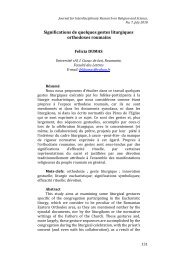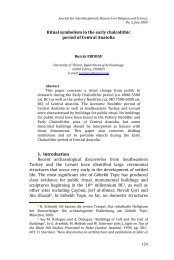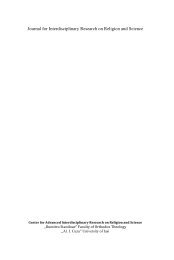Religious Dualism: Some Logical and Philosophical Difficulties
Religious Dualism: Some Logical and Philosophical Difficulties
Religious Dualism: Some Logical and Philosophical Difficulties
Create successful ePaper yourself
Turn your PDF publications into a flip-book with our unique Google optimized e-Paper software.
AFLOROAEI - <strong>Religious</strong> <strong>Dualism</strong>: <strong>Some</strong> <strong>Logical</strong> <strong>and</strong> <strong>Philosophical</strong> <strong>Difficulties</strong><br />
creation” 13 . According to this definition, not only<br />
Zoroastrianism <strong>and</strong> Gnosticism are dualist, but also Platonism<br />
(as radical dualism), since it “explains the eternal <strong>and</strong> irreducible<br />
nature of the universe through the doctrine regarding the idea, as well<br />
as through the doctrine of chora (<strong>and</strong> ananke), a theory of the cosmic<br />
cycle of existence attached to them” 14 . Bianchi considers that in<br />
Platonism we find a metaphysical <strong>and</strong> dialectical dualism, that<br />
is a cyclical one. He explains this by connecting the doctrine of<br />
ideas with the doctrine of the „metaphysical place” (chora,<br />
meaning place or receptacle) <strong>and</strong> with a vision of the cosmic<br />
necessity (ananke); the latter one being a doctrine of<br />
materiality as an irreducible <strong>and</strong> eternal element of<br />
cosmogony 15 . The doctrine of chora <strong>and</strong> ananke explains the<br />
fall of the pre-existent souls <strong>and</strong> the tripartite structure of the<br />
soul. As the Gnostics accepted <strong>and</strong> developed this doctrine,<br />
getting to a radical anticosmism, they are considered „radical<br />
<strong>and</strong> irreducible dualists” 16 . They differ from „the Christian<br />
eschatologism <strong>and</strong> from the dramatic conception of the soul’s spiritual<br />
fights” 17 in what concerns the idea of soul salvation.<br />
As we can see, dualism is characterised by the coexistence<br />
of two principles which are able to found the existence of all<br />
the things in our world. If one of these cosmogonic powers<br />
does not function as a principle which founds the existence of<br />
13 This definition given by Ugo Bianchi to dualism is already used in the<br />
introductory section of his study, where he also mentions that the existence<br />
based on the two assumed principals may be real or apparent. Discussing<br />
Marcion’s doctrine, Bianchi re-uses the previously defined sense of dualism,<br />
varying it slightly. He will refer to „the proper sense of the term which<br />
cannot be mistaken for other „dualisms”, that is a historical-religious sense.<br />
He adds, in a footnote, that he refers to dualism using the proper sense of a<br />
terminus technicus „when this world, or some parts of it, is the creation of a<br />
being or a force which limits in a positive way God’s universal power <strong>and</strong><br />
creativity; if this being or this force is considered to be inopportune or<br />
obviously malevolent <strong>and</strong> if they have an essential, constitutive influence on<br />
the structures of this world, then we can speak about anticosmic dualism:<br />
such as the Gnostic dualism” (ibidem, p. 320, footnote 2).<br />
14 Ibidem, pp. 313-314.<br />
15 Cf. Platon, Timaios, 47e – 48a, 48e – 49a, a synthetic idea mentioned<br />
in 52a – b.<br />
16 Ugo Bianchi, Selected Essays on Gnosticism, <strong>Dualism</strong> <strong>and</strong><br />
Mysteriosophy, Leiden, E. J. Brill, 1978, pp. 314 -315.<br />
17 Ibidem, p. 319.<br />
88





